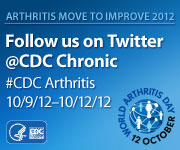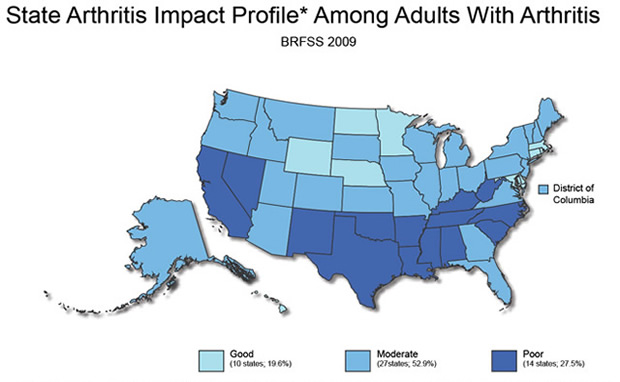Arthritis Awareness and Action
 Don’t let arthritis limit you. But, if you are one of the 50 million living with arthritis, there are some simple things you can do to reduce symptoms and live well.
Don’t let arthritis limit you. But, if you are one of the 50 million living with arthritis, there are some simple things you can do to reduce symptoms and live well.
World Arthritis Day—October 12, 2012
This year’s theme for World Arthritis Day is “Move to Improve.”
 Arthritis is the most common cause of disability among U.S. adults.1 One-quarter of adults with arthritis report severe pain, 45% report limitations in usual activities due to their arthritis, and almost 15% report that arthritis limits their ability to participate in valued social activities such as shopping, going to church, or attending a concert or sporting event.
Arthritis is the most common cause of disability among U.S. adults.1 One-quarter of adults with arthritis report severe pain, 45% report limitations in usual activities due to their arthritis, and almost 15% report that arthritis limits their ability to participate in valued social activities such as shopping, going to church, or attending a concert or sporting event.
Using 2009 data from the Behavioral Risk Factor Surveillance System, CDC created an arthritis impact profile for each state and the District of Columbia (see map below). States with a poor arthritis impact profile were in the worst third for each of three outcomes: prevalence of severe pain, arthritis-attributable activity limitations, and social participation restriction among adults with arthritis.
Fourteen states (27%) were classified as having a poor arthritis impact profile. More than 14.5 million adults with arthritis reside in these poor impact profile states. States with a poor impact profile were concentrated in the southern half of the United States. Tennessee had the worst impact profile overall, ranking 50th, 51st, and 51st in severe pain, activity limitation, and participation restriction, respectively. These data identify the states that have high need for widespread dissemination of proven arthritis interventions.

* Arthritis impact profile created using age-adjusted (2000 standard U.S. population) prevalence rates of impairment (severe pain), arthritis-attributable activity limitation, and social participation restriction. Poor = worst third for all 3 measures; Good = best third for all measures; Moderate = combination of best, middle, and worst thirds. Download chart [PDF - 194KB]
Move to Be Active
 The pain, activity limitations, and participation restriction due to arthritis can be managed, thus improving quality-of-life and reducing disability. Both aerobic and muscle strengthening exercise have been proven2,3 to reduce pain and improve functional limitations, thereby delaying disability and allowing people with arthritis to maintain independence. Physical activity can also help people with arthritis manage other chronic conditions they may have such as heart disease, diabetes, and obesity. Scientific studies3 have shown that participating in moderate-intensity, low-impact activities—such as walking, dancing, biking, swimming, and water aerobics—are good forms of exercise that are safe for most adults with arthritis. Several group classes specifically appropriate for people with arthritis are recommended by CDC and are made available in communities across the country.
The pain, activity limitations, and participation restriction due to arthritis can be managed, thus improving quality-of-life and reducing disability. Both aerobic and muscle strengthening exercise have been proven2,3 to reduce pain and improve functional limitations, thereby delaying disability and allowing people with arthritis to maintain independence. Physical activity can also help people with arthritis manage other chronic conditions they may have such as heart disease, diabetes, and obesity. Scientific studies3 have shown that participating in moderate-intensity, low-impact activities—such as walking, dancing, biking, swimming, and water aerobics—are good forms of exercise that are safe for most adults with arthritis. Several group classes specifically appropriate for people with arthritis are recommended by CDC and are made available in communities across the country.
Move to Learn Skills
Self-management education classes, such as the Chronic Disease Self-Management Program, have been proven to improve self-efficacy, exercise, ability to do house and social activities, and decrease depression, frustration and worry over health, and pain. Self-management education classes help people learn techniques to reduce pain and improve function and learn to develop skills and confidence to manage arthritis and other conditions on a day-to-day basis.
Move to Manage Your Weight
Obesity is common among people with arthritis and is a modifiable risk factor associated with arthritis-related disease progression, activity limitation, disability, reduced quality-of-life, total joint replacement, and poor clinical outcomes after joint replacement. Losing weight and maintaining a healthy weight may be challenging, but it is particularly important for people with arthritis. Low impact physical activity (like walking) and dietary changes can lead to successful weight loss for people with arthritis. In fact, losing as little as 10 to 12 pounds can improve pain and function.
Move to Talk to Your Health Care Provider
All people with arthritis should be under the care of a health care professional and should see them on a regular basis. For people with inflammatory types of rheumatic disease such as rheumatoid arthritis, proper medical management through medications and other treatments are crucial to managing pain, inflammation, fatigue, and preventing potential disability.Move to Get More Information
- World Arthritis Day
- Physical Activity and Arthritis
- Self-Management Education
- Healthy Weight
- American College of Rheumatology
- Arthritis Foundation
References
- CDC. Prevalence and most common causes of disability among adults, United States, 2005. MMWR. 2009;58:421-6.
- US Department of Health and Human Services. Physical Activity Guidelines Advisory Committee report, 2008. Washington, DC: US Depart of Health and Human Services; 2008. http://www.health.gov/paguidelines/committeereport.aspx. Accessed September 14, 2012.
- Kelley GA, Kelley KS, Hootman JM, Jones DL. Effects of community-deliverable exercise on pain and physical function in adults with arthritis and other rheumatic diseases: a meta-analysis. Arthritis Care Res. 2011;63(1):79-93.
Get email updates
To receive email updates about this page, enter your email address:
Contact Us:
- Centers for Disease Control and Prevention
1600 Clifton Rd
Atlanta, GA 30333 - 800-CDC-INFO
(800-232-4636)
TTY: (888) 232-6348 - Contact CDC-INFO



